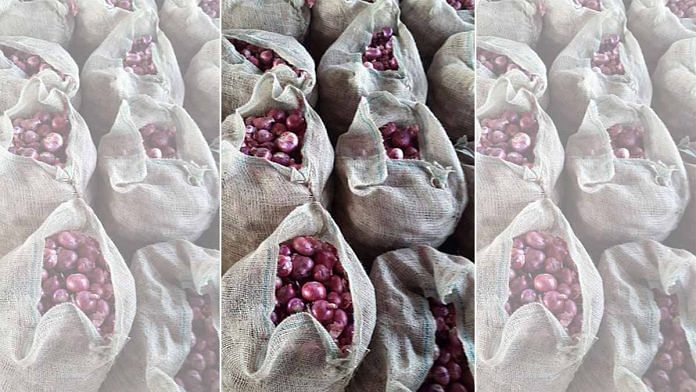Bengaluru: The Modi government’s ban on the export of all varieties of onions earlier this week has spelled doom for the growers of a special variety of onions — ‘Bangalore Rose’ — in Karnataka.
This special variety is exclusively grown in some parts of the state mainly for export to Southeast Asian countries such as Malaysia, Singapore, Thailand and Taiwan as it doesn’t have much demand in the domestic market.
The order issued by the Ministry of Commerce and Industry on 14 September specifically mentions that both Bangalore Rose onion and Krishnapuram onions (similar to Bangalore Rose) in cut, broken or powdered form are prohibited from export with immediate effect.
The government’s decision to ban the export of all varieties of onions was aimed at increasing the availability of the key kitchen staple and checking the price of the commodity in the domestic market.
Karnataka horticulture department officials told ThePrint the growers of Bangalore Rose onion will be severely hit due to the ban.
The Centre had banned the export of all varieties of onion last year too, but Bangalore Rose was given an exemption on the Karnataka government’s request.
This year also the state government has appealed to the Centre to exempt it from the ban. BJP MP Tejasvi Surya Wednesday requested the central government to exclude Bangalore Rose onions from the purview of the ban.
In a statement, the BJP MP from Bengaluru South said: “The ban on onion exports will hurt Karnataka farmers growing Bangalore Rose in Bengaluru Rural, Chikkaballapur and Kolar.”
“About 90 per cent of this variety is meant only for export — all to Southeast Asian countries — but farmers may have to sell it for lowly Rs 6 per kg. I request Honourable Commerce and Industry Minister Shri Piyush Goyal to exempt Bangalore Rose onions from the ban,” he added.
Also read: Know your onions: Peeling complex layers of a humble, pricey vegetable Mughals popularised
‘Will affect sales, prices to plummet’
According to an official in the state horticulture department, nearly 80-85 per cent of the Bangalore Rose onion produce hits the market during the Rabi season and the remaining 15-20 per cent during the Kharif season.
Karnataka annually produces 60,000 tonnes of this variety, the official added.
The official also told ThePrint that a farmer, who grows Bangalore Rose onion, would earn close to Rs 16-18 per kilo as profits. “But the ban will now affect their sales and prices will also plummet.”
He added: “Last year, during the ban, the state government convinced the Centre to exempt this variety. … tonnes of onions that were locked up in containers were allowed to be exported. This time the situation is slightly different. There are a lot of restrictions due to Covid.”
Anjaneya Reddy, representative of Bangalore Rose onion farmers in Chikkaballapur, told ThePrint the reason behind this sudden decision by the government is not known.
“There are thousands of farmers who have been growing these onions for generations. Suddenly stopping exports will affect their income. The farmers get a very good rate with these onions… We will appeal to the government to remove the restrictions on Bangalore Rose,” Reddy said.
Uniqueness of Bangalore Rose
Native to Karnataka, this variety of onion is mostly grown in Chikkaballapur, Doddaballapur, Kolar and Bengaluru Rural. Some pockets in Anantapur, Andhra Pradesh, also grow this variety, but in Karnataka, close to 5,000 acres of land cultivate it.
Its scarlet red bulb is shaped like a rose bud and its pungent smell adds to its uniqueness. It is often used to make pickled onions and also sold in pickled forms in supermarkets.
Since it is not very popular in the domestic market, it is grown almost exclusively for export.
Bangalore Rose onion received the Geographical Indication tag in 2015 and is popular in Southeast Asian countries where it is either used to make pickled onions or is dehydrated to make onion powder.
Also read: If 10 years from now you see 30 types of onions in Indian markets, this is how it happened




Export ban on onions and bill to facilitate farmers wherever they want to sell theirs produces. Heights of hypocrisy.